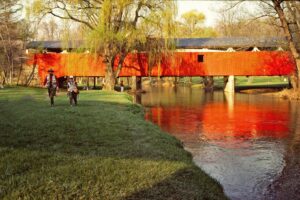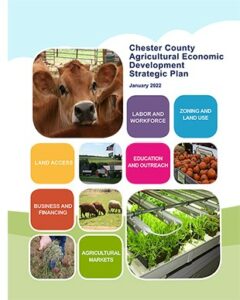The Latest News from PA Chapter of APA…
Pennsylvania is full of great places, and the Chapter’s Great Places program provides a fantastic way of acknowledging these places. Lehigh Parkway in Allentown, one of our 2021 Great Places winners, is highlighted in this month’s newsletter. Even if they aren’t award winners, many parts of the state are worth celebration, especially our rural agricultural landscapes and strong universities. This month, read about a new agricultural trend, agricultural economic planning, and a strong undergraduate planning program. Enjoy!
Telling Your Story: Effective Strategies for Communication
Next Webinar Wednesday is Wednesday, August 3 starting at noon. Successful public communication is more than surveys and opinion polls. It must also inform and educate, and that requires more than posting everything on your website. Even in a small community, that volume of data is overwhelming and can be frustrating to navigate. In this presentation, we will share how West Whiteland Township created the “Development by Design” brand and integrated it into their communications to organize a high volume of information during a period of rapid development, helping residents stay informed about what was happening in the Township while assuring them that all of this was, in fact, planned.
CM credit is pending approval. Deadline to register is August 2, 2022
If you’re interested in sponsoring a Webinar Wednesday session or have a session for Webinar Wednesday, please contact us. Send your request to info@planningpa.org.
The PA Chapter of APA extended the nomination process for the 2022 PA Chapter of APA Planning Awards, to be presented at the Annual Conference, October 2-4, 2022, in Lancaster. It is the opportunity to showcase distinguished individuals and successful projects – the best and brightest in Pennsylvania planning!
Nominations are encouraged for: Compelling Plans, Innovative Projects, Programs, and Practices and Inspiring leaders. Nominations are due by Friday, July 1! More information.
APA PA Annual Conference: Become a Sponsor
This year’s conference, “Forging Ahead: Adapting to Change!” takes place October 2-4 2022. The Annual Conference provides a unique and effective opportunity to showcase your work and capabilities to planning professionals and policy makers from across the Commonwealth. It’s also one of the ways to support planning in Pennsylvania by providing valuable networking, education, and development for planners.
Check out the marketing opportunity that best suits your needs. More information here.
Each year the Chapter offers a scholarship to support individuals seeking funds for academic degree programs, internships, and professional development activities. If anyone would like to contribute to the Chapter’s Scholarship fund, donations can be made here. We accept all major credit cards, or you can send a check. Please make your check payable to “PA Chapter of APA Scholarship Fund” and mail it to P.O. Box 4680, Harrisburg PA 17111.
APA PA Chapter Development Plan
Key Stakeholders of the APA PA Chapter gathered at the Penn Stater in State College on June 16 for a strategic planning meeting. The main objective of this session was to discuss the 2019-2022 Development Plan and develop new goals for the 2023-2026 Development Plan. Goals were drafted and will be presented at the Board meeting in September with final approval taking place at our December Board meeting. The APA-PA Chapter Board would like to thank all of those who attended and set the time aside to develop specific goals for the Chapter so we can continue to provide excellence in community planning to our members.
Place in Planning: Great Places 2021 Award Winner – Lehigh Parkway, Allentown PA
June’s feature of a Place in Planning is the 2021 Great Places in PA Award Winner Lehigh Parkway, located in Allentown PA. Great Places are unique, memorable places that display a wealth of best practices in community planning, serve as a community focal point, and strengthen the local economy. They also demonstrate the rewarding results that occur through planning, partnerships, and community engagement. 
Lehigh Parkway in Allentown and neighboring Salisbury Township, Lehigh County, is a 542-acre linear greenway along the Little Lehigh Creek connecting the urbanized areas of the two communities. Popular attractions are fishing and disc golf plus, with over six miles of trails, walkers, bikers, runners, and horseback riders are frequent users. Multiple trail heads are available to access the trails and adjacent activity centers. The Parkway showcases the area’s history through stone bank barns, an 1841 covered bridge, and the Museum of Indian Culture, as well as interpretive signage and historic markers. It also has “green” features to protect the environment. Numerous events, attracting thousands of visitors, are annually hosted in the Parkway. This regional hub for outdoor recreation is an economic driver and there is a strong commitment to sustain it through partnerships and philanthropic efforts.
Trend Alert: Digital, Indoor, Ultra Urban…Farming?

Image courtesy Ildar Sagdejev, Wikimedia Commons
Yes, Whole Foods Market’s Top Ten Food Trends for 2022 include edgy foodstuffs like yuzu, moringa, and hibiscus. But the top food trend may surprise you: ultra-urban farming.
Ultra-urban farming relies on CEA techniques. CEA is “controlled environment agriculture,” where crops are produced in an environment designed to provide optimal growing conditions. CEA systems can range from simple hoop houses or greenhouses to elaborate automated, closed-loop systems with controlled lighting, water, and ventilation. Advanced systems tend to minimize use of space, water, fertilizer, and pesticides and can also limit labor costs. Many CEA techniques are well-suited to urban areas and promise to provide high-quality food close to consumers. Advocates argue that they’re a key part of sustainable, resilient food systems. Critics say that their benefits are over-hyped.
In terms of land use, CEAs disengage farming practices from their traditional requirement of open land with good soil, a relationship that we as planners (and our zoning ordinances) tend to take for granted. What we know as planners is that, as agriculture increasingly crosses the rural/urban divide, CEA systems will be challenging to implement under regulations written when it was safe to assume that agriculture meant open space.
Planners in urban areas can expect to see indoor and rooftop ultra urban agriculture increasingly incorporated into master-planned residential and mixed-used developments, sometimes at the behest of government policies related to public health and community development. Planners everywhere can expect to see farming of all types adopt digital, technology-oriented approaches to production, while large swaths of traditional farmland become dedicated to farms of a completely different sort: solar energy production. APA PA wants to know what this looks like in your community. Please drop us a line through our social accounts!
In many planning documents and zoning ordinances, agricultural land use is either considered a type of open space or as a holding zone for future development. The reality is that agriculture is an active use in its own right that merits a focus from planners.
Like so many businesses, farms are under intense pressure to remain profitable, incorporate the newest technology, and meet sustainability demands. Recognizing the challenges that farmers face, the Agricultural Development Council in Chester County, which falls under the umbrella of the county planning commission, undertook an agricultural economic development strategic plan. This plan looked at the current situation for county farmers and identified actions they can take to prepare for the future of farming.
Here are a few of the more interesting recommendations:
- With great interest in ESG (Environmental, Social, and Governance) initiatives, farmers need to define what works best for them rather than have outsiders do it. Farm operators will need to be prepared for traceability and carbon credit markets. Farmers also need to actively show how their farms have a positive environmental impact.
- Urban agriculture and indoor ag are coming, particularly in a place like Chester County, which accounts for much of the state’s indoor ag production through its mushroom houses.
- With ongoing labor shortages, farms will need to become significantly more automated.
- Farmers need to add value to their products, such as making cheese out of milk, or diversify towards higher-value uses.
There are lots more strategies and recommendations in the plan, which can be viewed online.
Getting an Undergraduate Degree in Planning from West Chester University
There are a number of options for getting a planning degree in Pennsylvania. Mack Breech, class of 2022 from West Chester University, offers insights on his search for the right place for a planning degree and his experience at the school of his choice.
Mack notes that “West Chester University offers a high-quality planning degree at an affordable price. Finding the right planning program as an undergraduate is challenging and something I went through myself very recently. One major thing that drew me to West Chester’s program was the large variety of courses offered. The program is extensive and provides the opportunity to discover what topics you are passionate about. The department offers courses in land use planning, transportation planning, land development controls, planning theory/ethics, and many more practical hands-on classes. Two planning studio courses are required as capstones for the program and tie together all prior courses into an immersive and realistic planning experience. The program does a good job weaving GIS into the curriculum. It highlights the importance of ever-changing technology in the field of planning.”
“Another aspect of the program that drew me to West Chester is the department is extremely skilled at helping students grow professionally. Most professors have deep roots in the Pennsylvania planning community, and the internship opportunities are top-notch. The department works hard to ensure its students have every opportunity to network and build professional connections. The department holds a multitude of events with local planners and alumni, helping students regularly interact with professional planners. Guest speakers are fixtures in planning courses, providing students with additional resources and knowledge bases. Personally, I have made so many strong professional connections due to the resources that were at my disposal at West Chester. I graduated from the program feeling prepared for my career in planning due to my education at West Chester.”
Communication and Membership Committee
The Communication and Membership Committee is looking for volunteers to contribute articles for our monthly E-News. If you are interested or would like more information, please contact Amy Evans or Amy McKinney.


